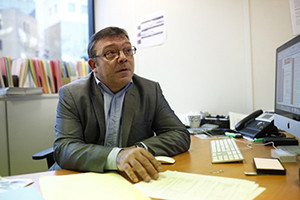William Molmy
head of INED’s International Affairs Department, answers our questions on current research policy and calls for research project proposals.

(Interview conducted in January 2017)
How is INED currently positioned with regard to European and international policy on research?
INED is currently involved in a considerable number of international research projects and is a partner in most of the major European-level research programmes in population science.
Together with the Agence Nationale de la Recherche (ANR), INED has been representing France at the general assembly of the “More Years, Better Lives” Joint Programming Initiative (JPI), an international scientific programming body, one of the EU’s 10 JPIs at this time.
In the coming months we will be working to strengthen our various international partnerships while undertaking new joint research projects and projects in the area of training and skills transfer. We are currently setting up a partnership strategy committee, and of course we are always working to ensure stronger representation of key INED research areas in the various programmes.
Another of our objectives is to increase the number of proposals INED submits in response to calls from the European Research Council (ERC).
What calls for proposals does INED answer?
We are currently concentrating on the ERC’s Marie Sklodowska-Curie grants, highly selective “excellence” grants made either on an individual basis or to researcher networks. Catherine Daurel, who heads the European affairs section at the International Affairs Department, is in charge of this mission.
Earlier on in the process, INED is becoming increasingly involved in shaping calls for proposals. We continue to participate in various national research topic groups (Groupes Thématiques Nationaux or GTN): INED researchers are very active in the groups and we work closely with them. It is in GTNs that institutions and researchers formulate comments and proposals for the pluriannual research programmes and grants that are put in place at the EU level.
With regard to grant applications, Karin Wigdorowicz coordinates our section on calls for projects and conventions, which works as a single interface for the research teams. The aim is to help researchers identify the grants most relevant for setting up the projects they have developed and to facilitate implementation of those projects. The section provides support for researchers for all fundraising efforts that generate research contracts and all types of partnerships, with or without financial implications. Here the section draws on the expertise of INED support services to assist researchers in all research contract processes, from monitoring calls for proposals to drawing up grant applications to developing and managing the research projects.
